In Japanese, chinchin ちんちん means multiple things: it's a childish way to say "penis." it can refer to a kind of dog trick; or to hopping on one leg; to a sound bells and microwave ovens make; to a different sound that kettles and boiling water make; it can mean jealousy; or that a couple has a good relationship; it's a term for the fry (young fish) of a black porgy; in soccer it means to win one-sidedly; and it can refer to a numbing feeling from cold. It's also spelled chinchin チンチン, and also romanized tintin.
Anime: Kaguya-sama wa Kokurasetai ~Tensai-Tachi no Ren'ai Zunousen かぐや様は告らせたい~天才たちの恋愛頭脳戦~ (Episode 7, Cropped)
"Penis"
The word chinchin ちんちん is a way to say "penis" in Japanese, but it's children's language. like "wiener," or "pee pee," "wee wee" in English.
The technical term for "penis" in Japanese would be inkei 陰茎.
- Context: the pinnacle of comedy.
- .........chinchin
・・・・・・・・・ちんちん
.........pee pee.
- Context: no context in the world will make this make any sense.
- Kaoru-dono!!
カオル殿!! - furo wa waite-imasuka?
風呂は沸いていますか?
Is the bath warmed up? - sessha hisashiburi ni anija to hairimasu!!
拙者久しぶりに兄者と入ります!!
I will, for the first time in a long time, enter [the bath] with my brother!! - kigae ga nai kara anija no wo karimasu!!
着替えがないから兄者のを借ります!!
[I] don't have a change of clothes so [I'll] borrow brother's!! - anija chinchin misete, chinchin!!
兄者ちんちん見せて ちんちん!!
Brother, show me [your] wiener, [your] wiener!!
Ochinchin
The word ochinchin おちんちん means "penis," and only "penis." It doesn't have the other meanings of chinchin. This happens because body parts, such as penises, can get a polite o- お~ prefix prefixed to them.
Dog Trick
The word chinchin ちんちん can also refer to a certain "dog trick," inu no gei 犬の芸, in which the dog puts its two front paws up, and appears stand up. Actually, it's often more like the dog is sitting with its two hind paws on the floor.
Anime: Kaguya-sama wa Kokurasetai ~Tensai-Tachi no Ren'ai Zunousen かぐや様は告らせたい~天才たちの恋愛頭脳戦~ (Episode 7, Cropped)
You might think that these two chinchin are somehow related, that the dog trick comes from the fight you might see the dog's chinchin while they're doing the chinchin, or something like that, but that's not the case.
This chinchin comes from chinza 鎮座, which normally means "enshrinement (of a divine spirit)." It's spelled with shizumaru 鎮まる, "to quiet down," and suwaru 座る, "to sit." A second meaning of this word is for something heavy to occupy a space, or rather, for something heavy to sit down, which's what's happening in the case of the dog. (he's sitting down on his hind paws.)(weblio.jp)
Manga: Kaguya-sama wa Kokurasetai ~Tensai-Tachi no Ren'ai Zunousen~ かぐや様は告らせたい~天才たちの恋愛頭脳戦~ (Chapter 27, かぐや様は堪えたい)
- Context: Kaguya has done her research.
- wakattemasu yo
わかったますよ
[I] get [it], [okay?] - inu no gei desu yo ne
犬の芸ですよね
[It's] the dog trick, [isn't it?] - {chinza wo gogen
to suru} tokoro no
chinchin desu yo ne
鎮座を語源とする所のちんちんですよね
[It's] the "chinchin" [that] {has "chinza" for origin.} - chanto wakattemasu yo!
ちゃんとわかってますよ!
[I] get [it] [perfectly]!
Onomatopoeia
The word chinchin チンチン is also a reduplicated onomatopoeia used in two different cases.
Bell, Microwave
First, it's the sound of a bell ringing when it's hit by something. From this, you get derived terms like:
- chin suru
チンする
To make "chin."- To microwave something. Because a "microwave," denshi renji 電子レンジ, makes a light beep sound when it finishes microwaving something.
- chinchin poteto
チンチンポテト
"Chinchin" potato.- Refers to a:
- furaido poteto
フライドポテト
"Fried potato." French fries. Chips. - That you make using a microwave.
Hot
A second chinchin チンチン onomatopoeia refers to the whistling sound that water makes when it's very hot inside of a kettle. It's also sort of a mimetic word, since it can refer to any liquid that's boiling hot, sizzling, regardless of whether it's making a chinchin sound or not.
- Context: Tetsutetsu Tetsutetsu 鉄哲徹鐵, whose body turns into "iron," tetsu 鉄, explains why he is the to face Todoroki Shouto 轟焦凍 in battle, who can use fire.
- kikanee kara da yo
効かねェからだよ
Because [it] doesn't have effect!
Because the fire doesn't work on me!- kiku
効く
To have effect.
- kiku
- kondo a Tetsutetsu ga chinchin da yo oi...!!
今度ァてつてつがチンチンだよオイ・・・!!
Tetsutetsu is chinchin now, oy...!!- kondo - "this time," "now."
- a ア - contraction of the wa は particle.
- shuuu
シュウウ
*vapor fuming* - ※ichibu chiiki de "atsu-atsu" no koto da kara ne!
※一部地域で“熱々”のことだからね!
※In a certain region [it] means "atsu-atsu" [you see]!- “” - quotation marks.
- Not to be confused with the chinchin that means "penis."
- atsu-atsu, "very hot" - intensifying reduplication of atsui 熱い, "hot."
- netsu de akaku [natta]...!
熱で赤く・・・!
[He] [became] hot with heat...!
Jealousy
The word chinchin ちんちん can also mean "jealousy." This comes actually comes from the boiling water sound meaning. You know how in cartoons when a character is angry their face becomes red like a tomato and then vapor starts coming out from their ears and stuff? It's the same thing, but jealousy instead of anger.
ちんちんかもかも
The term chinchin-kamokamo ちんちんかもかも refers to a couple that's in extremely good terms. It comes from the jealousy meaning of chinchin, in the sense that they're in such good terms that it makes you feel jealous for their relationship.
It's also abbreviated chichin-kamo ちんちんかも, and even just chinchin ちんちん. So you have a chinchin that comes from a chinchin that comes from another chinchin.
References
- 鎮座 - 三省堂 大辞林 via weblio.jp, accessed 2019-04-30.
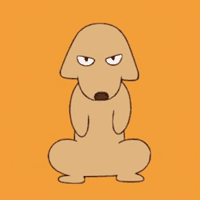
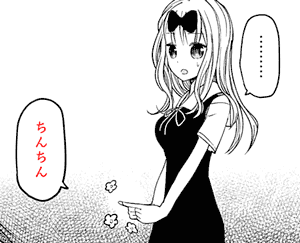
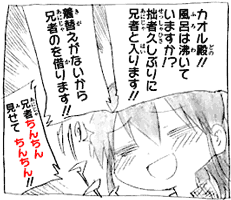
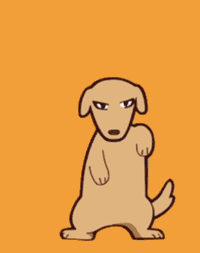
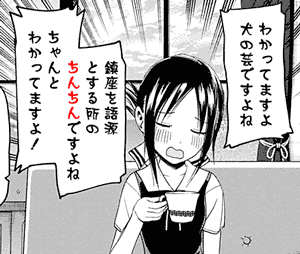
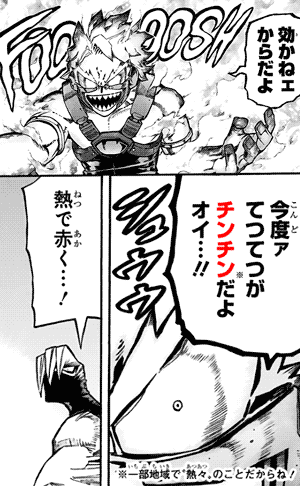
"So you have a chinchin that comes from a chinchin that comes from another chinchin."
ReplyDeleteHaha, I thought you meant their good relationship comes from the guy's ochinchin, before I counted up the chinchins properly. Or it _could_ be a chinchin that comes from a chinchin that comes from another chinchin that comes from yet another chinchin, maybe!